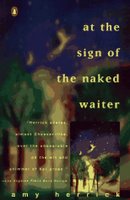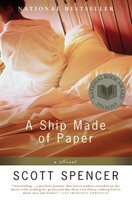at the sign of the naked waiter by Amy Herrick

At the sign of the naked waiter could have been a really fun novel.
It could have sprinkled its magical-ness into the drone of the everyday; described beauty, love and your place in this world with a poignant sweetness that wrenches at your heart. It could even have asked probing questions about the fine line between madness and enchantment. But it does none of this.
Instead, it is hopelessly mediocre, and often feels abrupt, incomplete and oddly skeletal as if the author wrote parts of it in a rush. In the book’s defense, I don’t really know how to judge this novel because I think this is young adult fiction. Would the teenage me have liked this book? Actually yes, very much. It has the sort of fantastical, magical realism that I was really into as a kid. But does that make it a good, competent book? I honestly can’t say. While it does not claim to be young adult fiction anywhere (I looked), the characters overflow with superficiality and teenage-angst. Even when they grow into adulthood, they have infantile tantrums and display a stunning level of immaturity. There’s an especially inane scene when Sarah, a lawyer and her fiancé, another lawyer, are having dinner when the immigrant waitress asks them for legal advice. “All she can do is marry a citizen”. The legal research for the book was apparently done by watching Perfect Strangers.
We meet the main character, Sarah when she is a teenager, on one pretty night “watching the moon sail high above the treetops”. She is about to spot her first, naked man across the way from her window. He apparently has wings, and he flies off into the night the next time she gazes at him. Who is he? Why does he have wings? We never find out, it ceases to matter once the chapter ends and she grows up some more. She also encounters two sponge-like, round alien balls from out of space that emit odors as a form of communication. Nothing more is said of them as well. The fantastical—while they occur with regular frequency—do not ever really faze the characters involved. They are as inconsequential and as worthy of contemplation as a parking lot—never interrupting the everyday business of growing up.
When we first meet Sarah, she is an awkward, shy teenager who is just beginning to feel the first pangs of love, school, and friends. In every chapter that follows, she grows up a few more years, has had a few more boyfriends and eventually a husband, and has climbed a new rung in her professional career. Oddly, while Sarah spends much of her time brooding about her future soul-mate, we are never really sure if she is even in love with the man she ends up marrying. This is mildly interesting.
At the sign of the naked waiter strives so hard to be pretty, with air that is always “soft” or “clear” or “touched with gold” or some combination there of. Starting with the mostly nonsensical title (there is an obligatory naked waiter at the end), the whole novel has an air of such forced whimsy, that I almost feel sorry for it. Like watching someone be willfully cheerful. It has crappy sentences like this all over. “She had the odd thought that a heavy weight was lifting from her head, a crown maybe, that she had been toting around with her since she was quite a young girl, a dumb gold thing, trimmed with fruit and white veils, little cakes and silver babies.” It’s as if Herrick strung together her creative writing exercises and called it a novel. A quick, forgettable book.


